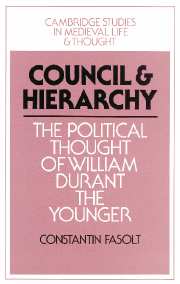Book contents
- Frontmatter
- Contents
- Acknowledgments
- List of abbreviations
- List of manuscript sigla
- INTRODUCTION
- PART I THE FORMATION OF INTEREST
- PART II THE ASSERTION OF JUSTICE
- PART III THE INCIDENCE OF POWER
- CONCLUSION
- Appendix: A note on texts and citations
- Bibliography
- Concordance
- Index
- Cambridge studies in medieval life and thought Fourth series
INTRODUCTION
Published online by Cambridge University Press: 06 July 2010
- Frontmatter
- Contents
- Acknowledgments
- List of abbreviations
- List of manuscript sigla
- INTRODUCTION
- PART I THE FORMATION OF INTEREST
- PART II THE ASSERTION OF JUSTICE
- PART III THE INCIDENCE OF POWER
- CONCLUSION
- Appendix: A note on texts and citations
- Bibliography
- Concordance
- Index
- Cambridge studies in medieval life and thought Fourth series
Summary
I have no doubt that there are some who will be irritated by my having at such length and with such enthusiasm advanced an argument which in reality may be not that important, not that indispensable, and even of no use to life at all.
Hermann ConringIn 1311, at the council of Vienne, William Durant the Younger, bishop of Mende and count of Gévaudan, demanded a reform of the church ‘in head and members’ – a phrase that would reverberate throughout the later middle ages and which he was among the first to introduce into public debate. The centre-piece of this reform was to consist of the transferral of the responsibility for the law of the church from the papacy to general councils, which would meet at ten-year intervals: ‘Henceforth the church of Rome ought to enact no general laws unless a general council has been convoked, and such a council ought to be convoked every ten years.’ Lest anyone should think that the papacy would still be free to change existing laws by granting dispensations, Durant declared explicitly that the papacy was not to ‘issue any dispensations, privileges, or exemptions contrary to the provident conciliar constitutions of the holy fathers unless a general council has been called.’ In support of these demands he invoked the famous principle that ‘what touches all must, according to the rule of both canon law and civil law, be approved by all in common’.
- Type
- Chapter
- Information
- Council and HierarchyThe Political Thought of William Durant the Younger, pp. 1 - 26Publisher: Cambridge University PressPrint publication year: 1991

